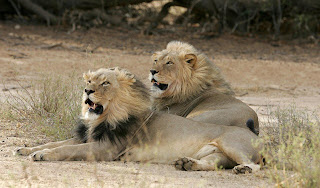I am asked by a tourist from Belgium as to what animal I wish to see that morning. I reply, "leopard". I have never seen a leopard in the Kalahari, so it is high on my wish-list. The leopard is nocturnal, so the best time to view an active leopard is between sunset and sunrise. An American chap tells me that he lives near Yellowstone Park, and asks if I have heard about that park. I tell him that I know that Yogi Bear lives there. There are smiles all around, the air is still crisp as we huddle in jackets, waiting for the gate-keeper, and to collect our permits.
Gemsbok in the riverbed.
The Park used to be called the Kalahari Gemsbok National Park.
There is no activity at the Samevloeiing water-hole. The two eland carcasses are still lying there, and scavengers have not dragged them away. We cannot detect any evidence of nocturnal activity. We see ostriches, wildebeest ( gnu ), springbok, red hartebeest and gemsbok (oryx ) . These are the Kalahari "regulars" and we don't even stop to photograph them, as they are often seen on game drives. It is a short drive this morning, as we have to head back to Twee Rivieren for breakfast and to pack up. I order a coffee with my breakfast at the restaurant, forgetting that the water is salty, and thus the coffee would have an unpleasant taste. I quickly cancel the order and settle for a fruit juice instead. Back at the chalet, I tap off the water we brought from Kuruman, and make coffee for everyone. I think the Mullins are grateful for our alternate source of water, even though the water containers are heavy and cumbersome, and take up valuable space in the car. We certainly would not have to drink, oily, salty or brack water on this trip.
Blue Wildebeest
The Mullins at Melkvlei
After a short break at Melkvlei, where we are allowed to get out and stretch our legs ( after checking for the presence of any predators ! ); we hit the road again. The road is in a very poor condition. It is so badly corrugated that we shake and shudder all the way to Nossob. It was Dave who said, " It is just shake, rattle and roll ".
Secretary Bird
Too hot to do anything.
We were hot and exhausted, and "all shook up", by the time we arrived at Nossob. Now, we need to set up camp ...






No comments:
Post a Comment